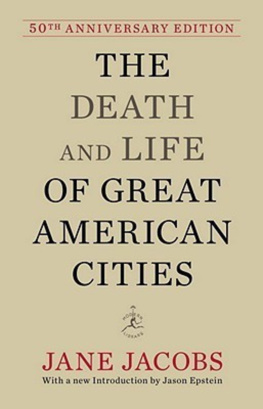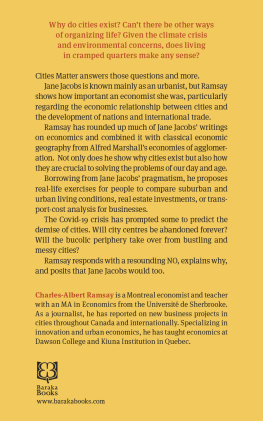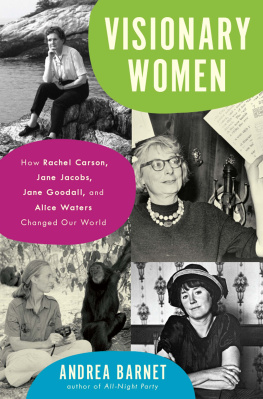Jane Jacobs - The Economy of Cities
Here you can read online Jane Jacobs - The Economy of Cities full text of the book (entire story) in english for free. Download pdf and epub, get meaning, cover and reviews about this ebook. year: 1970, publisher: Vintage, genre: Science. Description of the work, (preface) as well as reviews are available. Best literature library LitArk.com created for fans of good reading and offers a wide selection of genres:
Romance novel
Science fiction
Adventure
Detective
Science
History
Home and family
Prose
Art
Politics
Computer
Non-fiction
Religion
Business
Children
Humor
Choose a favorite category and find really read worthwhile books. Enjoy immersion in the world of imagination, feel the emotions of the characters or learn something new for yourself, make an fascinating discovery.

- Book:The Economy of Cities
- Author:
- Publisher:Vintage
- Genre:
- Year:1970
- Rating:4 / 5
- Favourites:Add to favourites
- Your mark:
- 80
- 1
- 2
- 3
- 4
- 5
The Economy of Cities: summary, description and annotation
We offer to read an annotation, description, summary or preface (depends on what the author of the book "The Economy of Cities" wrote himself). If you haven't found the necessary information about the book — write in the comments, we will try to find it.
The Economy of Cities — read online for free the complete book (whole text) full work
Below is the text of the book, divided by pages. System saving the place of the last page read, allows you to conveniently read the book "The Economy of Cities" online for free, without having to search again every time where you left off. Put a bookmark, and you can go to the page where you finished reading at any time.
Font size:
Interval:
Bookmark:
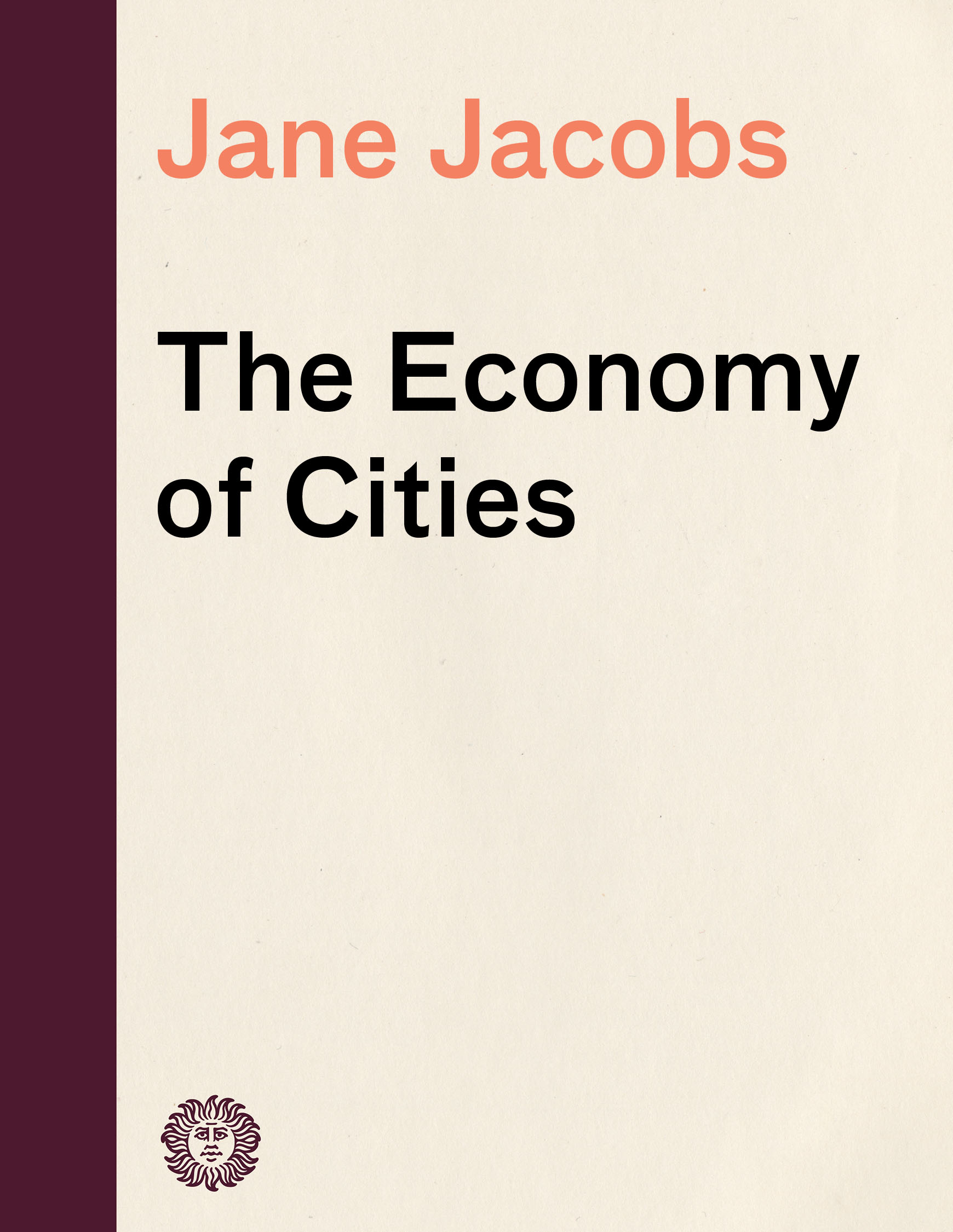
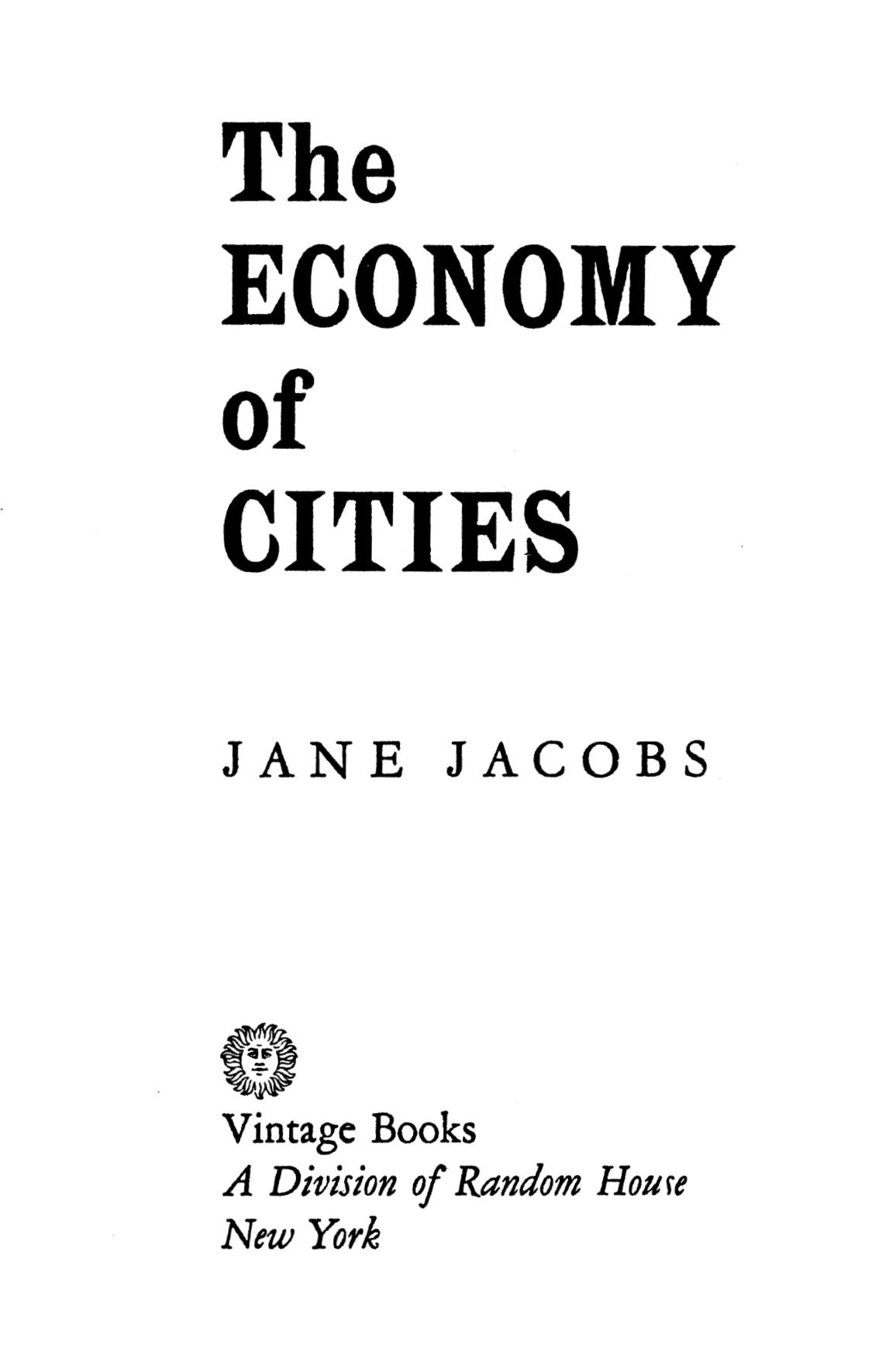

Vintage Books Edition, February 1970
Copyright 1969 by Jane Jacobs
All rights reserved under International and Pan-American Copyright Conventions.
Published in the United States by Random House, Inc., New York and simultaneously in Canada by Random House of Canada Limited, Toronto.
Originally published by Random House, Inc.
Library of Congress Catalog Card Number: 69-16413
Ebook ISBN9780525432869
v4.1
a
To
Betty, John, Jim
& our mother & father
I will [tell] the story as I go along of small cities no less than of great. Most of those which were great once are small today; and those which in my own lifetime have grown to greatness, were small enough in the old days.
HERODOTUS
The most valuable of a writers materials is uninterrupted time in which to write, and I am grateful beyond measure to my husband, Robert Hyde Jacobs, Jr., and my children, James, Edward and Mary, for their gifts to me of time and their cheerful protection of it against incursions. I am grateful also to Rachele Wall, Martin Berger and Arthur Stoliar for adding to their own burdens much of my share of the work on two civic efforts dear to me; and to Leticia Kent, Erik Wensberg, Richard Barnett and my lawyer, Charles Rembar, for the exuberance with which they have defended my liberty in a contretemps with the authorities, and thus have permitted this book to be completed.
For assistance with the work itself, I am again indebted to my family for many criticisms and ideas; to Jason Epstein, my editor and publisher, whose advice and faith have both been indispensable; to Erik Wensberg and Alice Mayhew for their skillful and sensitive editing; to Roderick Gittens, Mariam Slater, Ole Thomassen, W. Lain Guthrie and P. Sargant Florence for information and to John Decker Butzner, Jr., Martha Barnett, and Hans Blumenfeld for comment and criticism (although none of these is responsible for the use I have made of his knowledge); to Howard Bentley for his preparation of the index; and to the New York Public Library for the use of its Frederick Lewis Allen Room.
August, 1968
J.J.
Chapter
This book is an outcome of my curiosity about why some cities grow and why others stagnate and decay. I have relied greatly and gratefully upon the findingsreliable, as far as I am able to judgeof many scholars; historians and archeologists in particular. But I have not necessarily adopted their views about the meanings of their findings in my effort to develop a theory of city economic growth.
One of many surprises I found in the course of this work was especially unsettling because it ran counter to so much I had always taken for granted. Superficially, it seemed to run counter to common sense and yet there it was: work that we usually consider rural has originated not in the countryside, but in cities. Current theory in many fieldseconomics, history, anthropologyassumes that cities are built upon a rural economic base. If my observations and reasoning are correct, the reverse is true: that is, rural economies, including agricultural work, are directly built upon city economies and city work.
So thoroughly does the theory (in my view, the dogma) of agricultural primacy saturate the conventional assumptions about cities that I propose to deal with it in this chapter as the first order of business. In the chapters that follow I shall then describe what I have been able to learn about how cities grow, taking each part of the growth process separately. Thus this first chapter is a prologue.
We are all well aware from the history of science that ideas universally believed are not necessarily true. We are also aware that it is only after the untruth of such ideas has been exposed that it becomes apparent how pervasive and insidious their influence has been.
To take an example: for thousands of years otherwise intelligent men thought that those small animals found in rotting meat, cheese and still water took form and came to life without parents. Their environment, it was supposed, not only nourished them, it created them by a process called spontaneous generation. This theory seems to have gone unquestioned until the Renaissance, when a Florentine poet-physician demonstrated that maggots did not materialize in rotting meat if the meat had been screened from flies. He drew the proper inference that the new life arose from existing life. But just as his insight was gaining currency, the microscope was invented. Hitherto invisible bits of life now became visible. Their presence was promptly interpreted to be new proof of spontaneous generation and thus the dogma stood a full two centuries longer, buttressed, ironically, by the tools of science until it was demolished by Pasteur in the nineteenth century.
Pasteur repeated the Florentine experiment, using bacteria instead of flies as his experimental animals and wine instead of meat as his medium. His findings were savagely attacked by the most eminent biologists of his time because the new knowledge demolished so much that they knew about biology. For although the dogma of spontaneous generation ostensibly explained only the origins of tiny organisms, belief in it had subtly distorted much other biological observation and theory. It had simply closed off as already explained some very interesting questions, such as how single-celled animals really do multiply; hence had stultified the investigation and understanding of cells generally. For another thing, many biologists had invested their lives in rationalizing newly observed truths to conform with the traditional error; those biologists with the most eminent reputations had frequently been the authors of the most elaborate and arcane rationalizations.
In just such ways, I think, our understanding of cities, and also of economic development generally, has been distorted by the dogma of agricultural primacy. I plan to argue that this dogma is as quaint as the theory of spontaneous generation, being a vestige of pre-Darwinian intellectual history that has hung on past its time.
The dogma of agricultural primacy says: agriculture first, cities later. Behind the dogma lies the notion that in pre-Neolithic times hunting men lived only in small and economically self-sufficient groups, finding their own food, making their own weapons, tools and other manufactured goods. Not until some of these primitive groups learned to cultivate grain and raise livestock, it is thought, did settled and stable villages emerge, and not until after the villages were built did complex divisions of labor, large economic projects and intricate social organization become possible. These advances, coupled with a surplus of agricultural food, are supposed to have made cities possible.
One school of thought, the older, holds that cities evolved slowly, but directly, out of villages that were at first simple agricultural units but gradually grew both larger and more complex. Another school holds that cities were organized by non-agricultural warriors who put peasants to work for them, in return protecting the peasants from other warriors. In either version, the food produced by agricultural work and workers is presumed to have been an indispensable foundation for cities.
Font size:
Interval:
Bookmark:
Similar books «The Economy of Cities»
Look at similar books to The Economy of Cities. We have selected literature similar in name and meaning in the hope of providing readers with more options to find new, interesting, not yet read works.
Discussion, reviews of the book The Economy of Cities and just readers' own opinions. Leave your comments, write what you think about the work, its meaning or the main characters. Specify what exactly you liked and what you didn't like, and why you think so.

